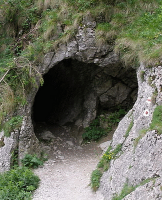Abraham and the Jaredites
I have often wondered if there might have been a connection between the patriarch Abraham and the Jaredites of the Book of Ether. After studying the matter, I have come to the conclusion that indeed there was. Or at the very least they were contemporaries. No mention is made by Abraham of the Jaredites in his record, and for that matter, he doesn't mention the Tower of Babel, with which he must have been familiar, or the confusion of tongues which must have been a noteworthy event in his day. Likewise there is no mention of Abraham in the record of the Jaredites. But Abraham's life span and his association with the king Nimrod do connect him with the age of the Jaredites.
Let's begin by calculating the age of Abraham from the chronology found in Gen. 11:10-27. Here we learn that he was born 292 years after the flood. He lived for 175 years and died 467 years after the flood. He was contemporary with many of the patriarchs. For example Noah didn't die until 450 years following the flood, and Shem outlived Abraham, dying 502 years after the flood. The Book of Jasher relates that Abraham was in fact raised by Noah and Shem. The destruction of the Tower of Babel, and the subsequent Confusion of Tongues probably occurred sometime between 300-400 years after the flood, so Abraham would certainly have shared this epoch age with the Jaredites, as well as all the others who were scattered to the four corners of the earth at that time.
As mentioned, Abraham is definitely connected to the Jaredites through king Nimrod. It was Nimrod and his people who tried to kill Abraham and sacrifice him to their heathen gods (see Abr. 1 and Jasher 12 ). This took place in Ur of the Chaldees, although it was a priest of the god of Egypt who actually tried to kill him. According to the Book of Jasher, Abraham's father Terah, was the captain of Nimrod's guard, so Abraham's family was prominent in Ur. However, referring again to the Book of Jasher, Abraham had been living with Noah and Shem in Salem (present day Jerusalem) until he was 50 so he may not have been overly involved with events in Ur.
On the other hand, the Jaredites were heavily involved in Babel. Indian legends relate that Jared or his brother even helped build the tower. They seem to have imbibed heavily of the Sumerian traditions which seem to show up later in their history. So although they lived in the same time period, and may have had random contact, they probably did not know of each other except through public events, or contact among groups.
Following the Confusion of Tongues the groups were scattered. It seems that the confusion was specific to family groups as they went out by colonies and settled various places on the basis of family origin according to the account in Josephus chapter 6. He then goes on to say:
AFTER this they were dispersed abroad, on account of their languages, and went out by colonies every where; and each colony took possession of that land which they light upon, and unto which God led them; so that the whole continent was filled with them, both the inland and the maritime countries. There were some also who passed over the sea in ships, and inhabited the islands: and some of those nations do still retain the denominations which were given them by their first founders.
Several points can be derived from Josephus' account. God led the dispersing groups, either overtly or covertly. The history of the various groups were known at least generally. There may have even been a knowledge of the destination of the Jaredites in the Americas. Some were led across the sea. And finally they were named after their original founders.
If this were the case with all the dispersing groups, then the story of the Jaredites in Ether is only a type of what happened repeatedly to many groups. The Jaredites would have been one of those who "passed over the sea in ships." Abraham's group may have even been one of these colonies. Ur of the Chaldees was struck by a famine about this time, which was probably related to the destruction at Babel. This caused Abraham and his group to move north to the place they called Haran, and subsequently south into Caanan, which area the Lord gave to Abraham and his posterity.
So we can assume that Abraham was part of the Jaredite milieu, and his migrations part of the general dispersal that occurred following the Confusion of Tongues at Babel.

No comments:
Post a Comment